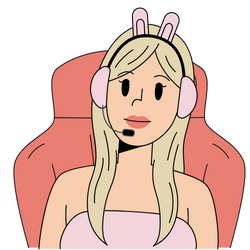Standard Troll Rebuttal Page #1:
“Who cares? It’s just a game”
“Why are you making such a big deal about the sexism in ____ ? It’s just a stupid game.”
“This stuff isn’t important. Feminism should be more concerned with matters [xyz] instead of ragging about videogames.”
These are not unfair questions to ask in general, but given the nature of why you’re here, they are intellectually dishonest.
Why are you here at Feminist Gamers? Chances are, you saw something about Sexism in [A Favorite Game of Yours]. And you were curious, or outraged, or whatever emotion you had that made you click on the link and read our thoughts on the subject.
So in other words, you were here because the game meant a lot to you. We understand: Games mean a lot to us too.
Games offer a unique entertainment experience for people. Unlike books, or movies, or music — videogames allow you to truly interact and shape the story. Even in highly-regimented games with linear storylines, the action of commanding your character(s) to perform specific actions or go to specific locations means that it’s you performing those actions or going to those specific locations more than anything else. Your control over the players allows you to feel a very personal identification with the storyline, and frankly, you’re not unique in this.
So if you came here because you felt a little pang of personal upset when you saw that we were critiquing a series that you especially liked, and you took the time to read through the whole post in order to simply reply “Who cares, it’s just a game” — it should be pretty obvious that you care, as much as we do, as much as anyone else who clicked through to read the post does.
But why is it important to look at sexism in games?
Sexism in videogames may not be the most crucial issue on the top of the feminist agenda, but it’s not entirely unimportant, either. And to be told that there are areas of our culture that should be magically exempted from feminist critiques is a request that smacks of desperation.
As mentioned above, the level of identification that a videogame allows you is important. It allows your to absorb into the game. The reason that women gamers tend to prefer games that allow them to play female protagonists probably has a lot to do with this identification. But when a game only offers up versions of ourselves that are either highly sexualized or completely helpless, it doesn’t help us in that identification process.
Also important is the “think of the children” effect. Videogames are part of the cultural fabric of childhood — as much as books, saturday morning and afterschool cartoons, and sports. When children look for the queues of how they are expected to act and behave when they are in school, with their friends, or out with their parents; they may look to model their personalities based on the characters in books, cartoons, or yes, even videogames, which little girls play, despite what marketers try to tell us.
The problem is not, of course, that they will become violent. If a child attempts to act agressively and attack another kid because they are trying to emulate Link, they’ll be disciplined and learn that videogame violence is best left inside the videogames. But behavior is more than just action — it’s a way of internalizing what is expected of you. Little girls are taught almost from birth to be quiet, compliant, passive, and that the most important thing is to be attractive to men. These lessons are reinforced when they play games that push women off in the corner to be rescued, or only allow them to pick up a sword if they’re wearing a bikini.
“Not my sister. Our father treated us the same, and she played soccer, and was a total tomboy.”
Well, good for her, and good for your dad. Unfortunately, unless your dad had you both out in some shack in the middle of nowhere, with no television, videogames, books or friends, and homeschooled you to boot, your sister was still being bombarded with messages that her behavior was not acceptable for a little girl. (An aside: Were the boys of this family encouraged to be sensitive, quiet, passive, and nurturing? If not — why? Was it because dad had decided that “female” qualities were so undesireable that he didn’t want them in his house at all? Think about what that means.)
No matter how much any one person may strive to shield their daughter from the influences our culture exerts on her; they will fail. The only way to truly teach girls that it’s okay to be something other than the frilly pink princess who gets rescued is to give them a positive role model to the contrary. Books and cartoon shows have worked to better-integrate more diverse representations of women into their medium. Unfortunately, most of the more popular videogame series still rely on women as either passive victims in need of rescuing, or sexpots that exist more for male titilation than female indentification. (Much love to Metroid and Beyond Good and Evil, of course).
The point of this site is not to make excuses for sexism in games, no matter how good they are. Feminist Gamers strives to provide a fair look at the gender roles and behavior are represented in videogames, and act as a sounding board for women gamers who feel that the medium could do better in its portrayals of women. We’re not a bunch of Jack Thompson-loving cranks intent of banning any title that we object to — we’re gamers who want to improve the medium. And if you can’t deal with that, then maybe you need to take a deep breath and remember, “it’s just a game.”
